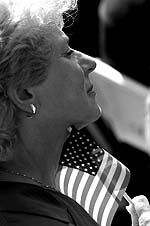|
Friday,
October 12, 2001
A
month like no other
As Americans cope with the aftermath of the
worst terrorist attack on U.S. soil, the nation’s leaders
are pressing on with the war against terrorism.
By Ron Fournier
Associated Press
WASHINGTON
— President Bush said Thursday night that after a five-day
aerial bombardment aimed at the al-Qaida network, “we’ve
got them on the run.” He said he doesn’t know whether
Osama bin Laden “is dead or alive. I want him brought
to justice.”
At
a prime-time news conference at the White House, Bush said
the war on terrorism “may take a year or two, but we
will prevail.”
 |
Chuck
Kennedy/KRT Campus
A
woman listens to speakers at a memorial service at
the Pentagon Thursday for the military and civilian
workers who were killed when a plane hijacked by terrorists
crashed into the building last month.
|
The
president said that an FBI warning issued earlier in the day
was the result of a “general threat” of possible
future terrorist acts the government had received.
“I
hope it’s the last, but given the attitude of the evildoers
it may not be,” he added.
At
the same time, Bush sought to reassure Americans the government
was doing all it could to make them safe. “If we receive
specific intelligence that targets a specific building or
city or facility I can assure you our government will do everything
possible to protect the citizens,” he said.
Bush
also said that Syria, a nation often linked with terrorist
groups, had expressed a desire to help with the anti-terror
coalition, “and we’ll give them an opportunity to
do so.” He did not give specifics on the type of assistance
Syria offered, but said he takes it seriously.
“If
you want to join the coalition against terror, we will welcome
you,” Bush said.
Bush
suggested that once the U.S. military involvement is complete,
and the Taliban rulers of Afghanistan routed, that the United
Nations become involved in creating a stable new government.
Asked
whether he was calling for sacrifice from Americans as part
of the war against terrorism, Bush said, “I think there’s
a certain sacrifice when you lose a piece of your soul.”
He said he had seen tears in the eyes of some of the people
attending a ceremony of remembrance earlier in the day at
the Pentagon.
Bush
spoke at the first prime-time news conference of his presidency,
but more importantly, one month to the day after terrorist
attacks in New York and Washington murdered thousands, damaged
the nation’s economy and shattered its complacency.
In the month since, the president has labored to construct
a foundation for an international war on terrorism, moving
to choke off the funding essential for terrorists to carry
out their strikes, lining up support from other nations, creating
a new Office of Homeland Security and — beginning on
Sunday — unleashing the nation’s military.
The
news conference capped a national day of remembrance. There
were memorial services around the nation to remember the more
than 5,000 people killed when suicide hijackers seized four
commercial airliners and crashed them into the World Trade
Center in New York, the Pentagon and the Pennsylvania countryside.
The
president attended one ceremony, at the Pentagon, where he
said the hijackers had “died in vain.” He said their
co-conspirators in terrorism “will be isolated, surrounded,
cornered until there is no place to run or hide or rest.”
Machine
gun-toting troops stood guard in camouflage, providing security
for a service that drew not only the president and first lady,
Laura Bush, but also former President Bill Clinton, dozens
of members of Congress, relatives of the attacks victims and
a throng of thousands of guests.
The
Pentagon ceremony was a blend of prayer, hymn-singing and
speech-making — and included a mournful honor roll of
the dead, names scrolled on video screens for the crowd to
see.
“We
remember them as heroes,” said Defense Secretary Donald
H. Rumsfeld. “And we are right to do so.”
The
nation bore signs of recovery, the stock markets regaining
much of the ground they lost, the postseason major league
baseball playoffs under way. And yet reminders of the loss
and continuing threat were everywhere.
At
the World Trade Center, fires still smoldered. Vice President
Dick Cheney was removed to an undisclosed secure location,
returning to the White House only on Thursday. And the FBI
issued the latest in a string of cautions that Americans should
be on alert for more attacks.
Asked
about whether he envisioned expanding military action beyond
Afghanistan to Iraq and Syria, Bush said that the United States
would “bring to justice” nations that harbor terrorists.
In particular, he called Iraqi leader Saddam Hussein an “evil
man” and added, “we’re watching him very carefully.”
While
the current focus is on Afghanistan, he said “we’re
looking for al-Qaida cells around the world” — and
if the United States find any, it will pursue them.
Despite
the aerial pounding, Bush held out a carrot to the Taliban
rulers of Afghanistan harboring bin Laden. “You still
have a second chance. Just bring him in and bring his leaders
and lieutenants and other thugs and criminals with him.”
|